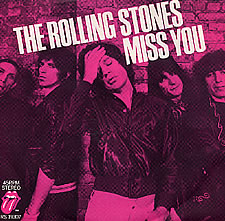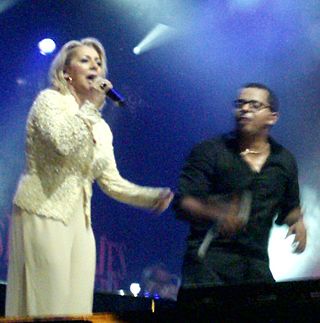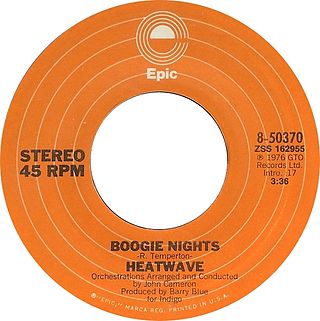Related Research Articles

Eumir Deodato de Almeida is a Brazilian pianist, composer, arranger and record producer, primarily in jazz but who has been known for his eclectic melding of genres, such as pop, rock, disco, rhythm and blues, classical, Latin and bossa nova.

Gino Vannelli is a Canadian rock singer and songwriter who had several hit songs in the 1970s and 1980s. His best-known singles include "People Gotta Move" (1974), "I Just Wanna Stop" (1978), "Living Inside Myself" (1981) and "Wild Horses" (1987).

Hugo Mario Montenegro was an American orchestra leader and composer of film soundtracks. His best-known work is interpretations of the music from Spaghetti Westerns, especially his cover version of Ennio Morricone's main theme from the 1966 film The Good, the Bad and the Ugly. He composed the score for the 1969 Western Charro!, which starred Elvis Presley.

"Miss You" is a song by the English rock band the Rolling Stones, released on Rolling Stones Records in May 1978. It was released as the first single one month in advance of their album Some Girls. "Miss You" was written by Mick Jagger and Keith Richards.

Patricia Gallant is a Canadian pop singer and musical theatre actress. Of Acadian ancestry, she has recorded and performed in both English and French.
Jerry Victor Doucette was a Canadian guitarist and singer-songwriter. He was noted for his hit single "Mama Let Him Play", which made the Billboard Top 100. His band, Doucette, won the Juno Award for Most Promising Group of the Year in 1979.

Heartbreaker is the twentieth solo studio album by American singer-songwriter Dolly Parton. It was released on July 17, 1978, by RCA Victor. The album was produced by Gary Klein and Parton with Charles Koppelman serving as executive producer, and was an even more direct aim at the pop charts, with several of its songs verging on disco. The album topped the Billboard Top Country Albums chart for nine consecutive weeks and peaked at number 27 on the Billboard 200. The album produced two number one hits on the Billboard Hot Country Songs chart, "Heartbreaker" and "I Really Got the Feeling", while "Baby I'm Burnin'" peaked at number 25 on the Billboard Hot 100. The album has been certified Gold in the United States and Canada.

"Baby, Now That I've Found You" is a song written by Tony Macaulay and John MacLeod, and performed by the Foundations. Part of the song was written in the same bar of a Soho tavern where Karl Marx is supposed to have written Das Kapital. The lyrics are a plea that an unnamed subject not break up with the singer.

"Turn to Stone" is a 1977 song by Electric Light Orchestra (ELO).

"Sweet Talkin' Woman" is a 1978 single by Electric Light Orchestra (ELO) from the album Out of the Blue (1977). Its original title was "Dead End Street", but it was changed during recording. Some words that survived from that version can be heard in the opening of the third verse, "I've been livin' on a dead end street".

"Don't Bring Me Down" is the ninth and final track on the English rock band the Electric Light Orchestra's 1979 album Discovery. It is their highest-charting hit in the United States to date.

The discography of the English rock band Electric Light Orchestra (ELO) consists of 15 studio albums, seven live albums, 40 compilation albums, 13 video albums, 33 music videos, one extended play, 50 singles, one soundtrack album and eight box sets. ELO have also sold over 50 million records worldwide.
Once Upon a Time in the West: The Original Soundtrack Recording is a soundtrack composed by Ennio Morricone, from the 1968 western film of the same name directed by Sergio Leone, released in 1972. The film score sold about 10 million copies worldwide.

"Boogie Nights" is a 1977 single by international funk-disco group Heatwave. It was written by keyboardist Rod Temperton and was included on Heatwave's debut album, Too Hot to Handle. Harpist Carla Skanger played harp and American actor and singer Clarke Peters performed backing vocals on the recording.
The Powder Blues Band is a Canadian musical band formed in 1978 in Vancouver. Its first album Uncut went double platinum in Canada. The second album Thirsty Ears was similarly popular.
Family Brown was a Canadian country music band founded in 1967 by Joe Brown, along with his son Barry and daughters Lawanda and Tracey (vocals), as well as Dave Dennison (guitar) and Ron Sparling (drums). Between 1967 and 1990, the band charted several singles in both Canada and the United States. The band also won eighteen Canadian Country Music Association awards, the most received by any artist. After disbanding in 1990, Barry and Tracey Brown and Randall Prescott formed the group Prescott-Brown in 1991.

"Always and Forever" is an R&B song written by Rod Temperton and produced by Barry Blue. It was first recorded by the British-based multinational funk-disco band Heatwave in 1976. Released as a single on December 3, 1977, the song is included on Heatwave's debut album Too Hot to Handle (1976) and has been covered by numerous artists, becoming something of a standard.
The THP Orchestra was a 1970s Canadian disco group from Toronto created by European producers Willi Morrison and Ian Guenther. The band released its first album in 1977 and was nominated for a Juno Award for Most Promising New Group. After two releases in two years, the group shortened its name Three Hats Productions to THP and released a third album on Atlantic Records. It disbanded in 1980.
Nestor Pistor is the stage name of Don Ast, a Canadian comedian of Romanian heritage who performs in the character of a heavily accented Ukrainian immigrant. He has been a three-time Juno Award nominee for Comedy Album of the Year, receiving two nominations at the Juno Awards of 1979 for his albums Nestor Pistor for Prime Minister and Best of Nestor Pistor and one nomination at the Juno Awards of 1980 for the self-titled Nestor Pistor, and a nominee for Most Promising Male Vocalist at the Juno Awards of 1977.

Roger Prud'homme, better known by the stage name of Martin Stevens, was a Canadian pop singer prominent in the disco era. He was most noted as a two-time Juno Award nominee for Best Selling Single, receiving nominations at the Juno Awards of 1979 for "Love Is in the Air" and at the Juno Awards of 1980 for "Midnight Music".
References
- ↑ "Canadians Honor RCA and Polydor". Billboard , December 17, 1977.
- ↑ "Canadian Acts Win Acceptance South of Border". Billboard , May 5, 1979.
- ↑ "RCA Canada Eyes Rock Signings". Billboard , March 24, 1979.
- ↑ "Black Light Orchestra – Once Upon A Time..." discogs.com. Discogs. Retrieved 23 March 2022.
- ↑ "Disco". The Canadian Encyclopedia.
- ↑ "Adult Contemporary". RPM - Volume 28, No. 19 Feb 04, 1978
- ↑ "Top Singles". RPM - Volume 28, No. 13. Dec 24, 1977
- ↑ "Top Albums/CDs" - Volume 28, No. 19. Feb 04, 1978
- ↑ "Black Light Orchestra – This Time". discogs.com. Discogs. Retrieved 23 March 2022.
- 1 2 Alan Jones; Jussi Kantonen (1 September 2000). Saturday night forever: the story of disco. A Cappella Books. p. 25. ISBN 978-1-55652-411-0.
- ↑ "Label Product Balance". Billboard. Nielsen Business Media, Inc. 29 October 1977. pp. 1–. ISSN 0006-2510.
- ↑ "The Junos: Hill and Cummings the frontrunners". The Globe and Mail , March 23, 1978.
- ↑ "A History of Best New Artist". The Ottawa Citizen, Ottawa, Canada, April 5, 2003, Page: 116